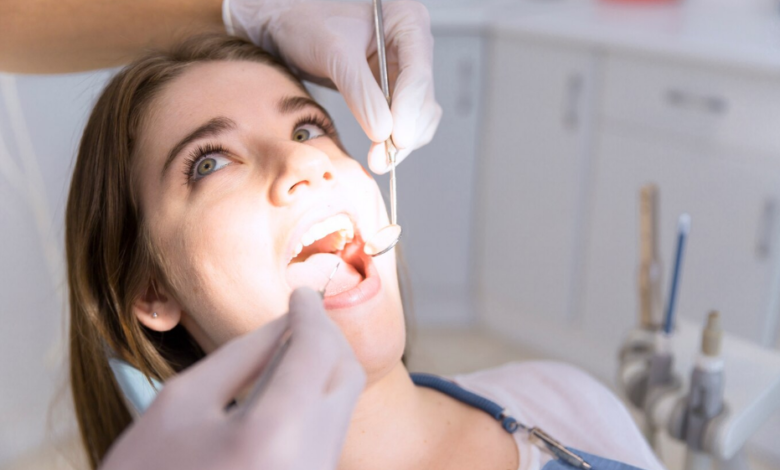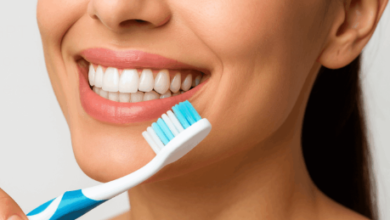Understanding Your Options for Tooth Extraction in Mississauga

Reasons for Tooth Extraction in Mississauga
Sometimes, despite our best efforts, a tooth extraction in Mississauga becomes necessary for overall oral health. It’s not usually the first choice, but in certain situations, it’s the most sensible path forward. Let’s explore some common reasons why a dentist might recommend removing a tooth.
Severe Tooth Decay Beyond Repair
When tooth decay progresses to an advanced stage, it can compromise the entire tooth structure. If the damage is too extensive for fillings, crowns, or even root canal therapy to fix, extraction might be the only option. Think of it like a building with a foundation so rotten it can’t be saved – sometimes you have to start over. This prevents further infection and protects the surrounding teeth from being affected.
Advanced Periodontal Disease
Periodontal disease, also known as gum disease, can wreak havoc on the tissues and bone that support your teeth. In severe cases, the supporting structures are so badly damaged that the tooth becomes loose and unstable. At this point, extraction might be necessary to prevent the infection from spreading and to preserve the health of the remaining teeth. It’s like pulling a weed to stop it from taking over the whole garden.
Impacted Wisdom Teeth Issues
Wisdom teeth, those late bloomers in the back of your mouth, often cause problems. They can become impacted, meaning they don’t have enough room to erupt properly. This can lead to pain, infection, damage to adjacent teeth, and even cysts or tumors. In many cases, extracting impacted wisdom teeth is the best way to prevent these complications. It’s a preemptive strike to avoid bigger problems down the road.
Overcrowding for Orthodontic Treatment
Sometimes, the mouth is simply too crowded to accommodate all the teeth properly. This can lead to crooked teeth, difficulty cleaning, and an increased risk of decay and gum disease. In these situations, a dentist might recommend extracting one or more teeth to create space for orthodontic treatment, such as braces or aligners, to align the remaining teeth correctly. It’s like decluttering a closet to make room for new clothes – you have to get rid of some things to make everything fit.
Preparing for Your Tooth Extraction in Mississauga
So, you’re getting ready for a tooth extraction in Mississauga? Good planning is key to making the whole thing go smoothly. It’s not just about showing up on the day; there are a few important steps your dentist will take to get you ready.
Comprehensive Oral Examination and X-rays
First things first, your dentist will want to get a good look at what’s going on in your mouth. This usually involves:
- A thorough check-up: They’ll examine the tooth that needs to come out, as well as the surrounding teeth and gums. This helps them understand the full picture and spot any potential problems.
- X-rays: These images give the dentist a view of the tooth roots and the bone around the tooth. It’s super helpful for planning the extraction, especially if it’s a tricky one.
- Assessing the area: The dentist will check for any signs of infection or inflammation that might need to be addressed before the extraction.
Review of Medical History and Medications
This part is really important for your safety. Your dentist needs to know about:
- Any medical conditions you have: Things like diabetes, heart problems, or bleeding disorders can affect how the extraction is done and how you heal afterward.
- All medications you’re taking: This includes prescription drugs, over-the-counter meds, and even supplements. Some medications can interact with anesthesia or affect blood clotting.
- Allergies: Make sure to tell your dentist about any allergies you have, especially to medications or latex.
Preoperative Care Instructions
Your dentist will give you specific instructions to follow before your extraction. These might include:
- What to eat or not eat: You might need to avoid eating for a certain amount of time before the procedure, especially if you’re getting sedation.
- Medication adjustments: In some cases, you might need to adjust your medication schedule before the extraction. Your dentist will let you know if this is necessary.
- Arranging for a ride: If you’re getting sedation, you’ll need someone to drive you home after the procedure.
- Oral hygiene: You’ll want to brush and floss gently before the extraction to keep your mouth as clean as possible.
Understanding the Procedure and Aftercare
It’s normal to feel a little nervous about getting a tooth pulled. Your dentist should explain:
- What to expect during the extraction: They’ll walk you through the steps of the procedure so you know what’s going to happen.
- Anesthesia options: They’ll discuss the different types of anesthesia available and help you choose the one that’s right for you.
- Aftercare instructions: You’ll get detailed instructions on how to care for the extraction site after the procedure. This will include things like managing pain, preventing infection, and what to eat.
Types of Tooth Extractions in Mississauga
When you need a tooth pulled, it’s not always a one-size-fits-all situation. There are different kinds of extractions, and the type you need depends on the tooth and the reason for taking it out. Understanding these differences can make the whole process less scary. When considering a tooth extraction mississauga, it’s important to know what options are available.
Simple Tooth Extractions
Simple extractions are usually done on teeth that are visible in your mouth. If your tooth is easy to see and grab, this is probably the type you’ll get. Here’s what to expect:
- The dentist will numb the area around the tooth with a local anesthetic. You’ll feel pressure, but no pain.
- Using an instrument called an elevator, the dentist will loosen the tooth.
- Then, with forceps, they’ll grab the tooth and gently rock it back and forth to remove it.
- After the tooth is out, they’ll pack the socket with gauze to stop the bleeding.
Surgical Tooth Extractions
Surgical extractions are more complicated. They’re needed when a tooth is broken at the gum line or hasn’t fully come in yet (impacted). Here’s what makes them different:
- You might get local anesthesia and sedation, or even general anesthesia, depending on how complex the extraction is.
- The dentist or oral surgeon will make a small cut in your gum to reach the tooth.
- They might need to remove some bone around the tooth to get it out.
- Sometimes, the tooth needs to be cut into pieces to make it easier to remove.
- After the tooth is out, the gum is stitched up.
Wisdom Tooth Extraction
Wisdom teeth are notorious for causing problems. They often get impacted, grow in at weird angles, or cause pain and infection. Because of this, wisdom tooth extractions are pretty common. They’re almost always surgical extractions because wisdom teeth are often impacted. The procedure usually involves:
- Anesthesia options similar to surgical extractions – local with sedation or general anesthesia.
- Cutting the gums and removing bone to access the tooth.
- Sectioning the tooth if needed.
- Stitching up the gums and packing the sockets with gauze.
Emergency Tooth Extraction
Sometimes, a tooth needs to come out right away. This could be because of:
- Severe infection that’s spreading.
- A tooth that’s been badly broken in an accident.
- Extreme pain that can’t be controlled with other treatments.
Emergency extractions are usually done as quickly as possible to relieve pain and prevent further problems. The type of extraction (simple or surgical) will depend on the specific situation.
Post-Extraction Care and Recovery in Mississauga
So, you’ve just had a tooth extraction in Mississauga. Now comes the important part: taking care of yourself so you heal quickly and without problems. It’s not rocket science, but following these guidelines will make a huge difference in your recovery.
Managing Pain and Swelling
Alright, let’s talk about pain. It’s normal to feel some discomfort after an extraction, but there are ways to manage it. Here’s what I usually do:
- Pain Medication: Your dentist will likely prescribe or recommend over-the-counter pain relievers. Follow the instructions carefully. Don’t wait until the pain is unbearable to take them.
- Cold Compresses: Apply ice packs to your cheek for 15-20 minutes at a time, several times a day, especially during the first 24-48 hours. This helps reduce swelling and numbs the area.
- Rest: Seriously, take it easy. Avoid strenuous activities for a few days. Your body needs to focus on healing, not running a marathon.
Maintaining Oral Hygiene
Keeping your mouth clean is super important, but you need to be gentle. Here’s the deal:
- Gentle Rinsing: Starting 24 hours after the extraction, rinse your mouth gently with warm salt water (1/2 teaspoon of salt in 8 ounces of water) after meals and before bed. Don’t swish too vigorously, or you might dislodge the blood clot.
- Careful Brushing: Brush your teeth as usual, but avoid the extraction site for the first few days. Use a soft-bristled toothbrush and be extra gentle around the area.
- Avoid Irritants: Stay away from mouthwashes containing alcohol, as they can irritate the extraction site.
Dietary Recommendations After Extraction
What you eat matters a lot during recovery. Stick to soft foods that won’t irritate the area. Here are some ideas:
- Soft Foods: Think yogurt, applesauce, mashed potatoes, smoothies, and soup. Avoid anything that requires a lot of chewing.
- Hydration: Drink plenty of fluids, but avoid using a straw, as the sucking motion can dislodge the blood clot.
- Avoid Certain Foods: Stay away from hard, crunchy, or sticky foods that can get stuck in the extraction site. Also, avoid spicy foods, as they can cause irritation.
Recognizing Signs of Complications
Most extractions go smoothly, but it’s important to know what to look out for. Contact your dentist immediately if you experience any of the following:
- Severe Pain: Pain that doesn’t improve with medication or gets worse over time.
- Excessive Bleeding: Bleeding that doesn’t stop after applying pressure for 30 minutes.
- Signs of Infection: Fever, chills, redness, swelling, or pus around the extraction site.
- Dry Socket: Intense throbbing pain a few days after the extraction, often accompanied by a bad taste or odor in your mouth.
Potential Risks and How to Avoid Them
While tooth extraction in Mississauga is generally safe, it’s important to be aware of potential risks and how to minimize them. Knowing what to look out for can make your recovery smoother and less stressful. Let’s talk about some common issues and what you can do.
Understanding Dry Socket
Dry socket is probably the most talked-about complication after a tooth extraction. It happens when the blood clot that’s supposed to form in the socket either doesn’t form or gets dislodged too early. This exposes the bone and nerves underneath, leading to pretty intense pain. Here’s what you need to know:
- What it feels like: A throbbing pain that starts a few days after the extraction. It’s usually way worse than the pain you had right after the procedure.
- How to avoid it:
- Don’t smoke! Smoking is a major culprit.
- Avoid using straws for a while, as the sucking action can dislodge the clot.
- Follow your dentist’s instructions about rinsing your mouth.
Preventing Post-Extraction Infection
Infection is another risk, though it’s less common if you take good care of the extraction site. Bacteria can get into the socket and cause problems. Here’s how to keep that from happening:
- Keep it clean: Gently rinse your mouth with salt water as directed by your dentist. This helps kill bacteria.
- Good oral hygiene: Continue brushing your other teeth, but be very gentle around the extraction site.
- Watch for signs: If you notice increased pain, swelling, redness, pus, or a fever, call your dentist right away. These are signs of infection.
Addressing Prolonged Swelling or Pain
Some swelling and pain are normal after an extraction, but if it lasts longer than expected or gets worse, something might be wrong. Here’s what to do:
- Normal vs. Not Normal: Expect some discomfort for a few days. But if the pain is unbearable or the swelling is getting worse after 3-4 days, it’s time to call your dentist.
- Possible causes: Prolonged swelling or pain could be a sign of infection, dry socket, or even a small piece of bone that needs to be removed.
- What to do: Don’t wait it out. Contact your dentist. They can figure out what’s going on and give you the right treatment.
Importance of Following Dentist’s Instructions
Seriously, this is the most important thing. Your dentist gives you specific instructions for a reason. They know what they’re doing, and following their advice is the best way to avoid problems.
- Medications: Take any prescribed antibiotics or pain relievers exactly as directed.
- Diet: Stick to soft foods for the first few days to avoid irritating the extraction site.
- Follow-up appointments: Go to any scheduled follow-up appointments so your dentist can check how you’re healing.
Cost and Insurance Considerations for Tooth Extraction in Mississauga
Deciding on a tooth extraction in Mississauga involves more than just the procedure itself; understanding the financial aspect is also important. Let’s break down the costs and how insurance might help.
Factors Influencing Extraction Cost
Several things affect how much a tooth extraction will set you back. It’s not a one-size-fits-all situation. Here’s what to keep in mind:
- Complexity of the Extraction: A simple extraction is usually cheaper than a surgical one. If the tooth is impacted or broken below the gum line, it’ll likely cost more because it requires more work.
- Anesthesia Type: Local anesthesia is standard and generally included in the base cost. However, if you need sedation (like nitrous oxide or IV sedation) to help you relax, that’ll add to the total.
- Number of Teeth: Obviously, extracting multiple teeth will increase the overall cost. Each tooth comes with its own extraction fee.
- X-rays and Exams: The initial consultation and X-rays needed to assess the tooth’s condition are separate costs you’ll need to factor in.
Understanding Your Insurance Coverage
Dental insurance can significantly reduce your out-of-pocket expenses. Here’s how to figure out what your plan covers:
- Review Your Policy: Take a close look at your dental insurance policy. Pay attention to the annual maximum, deductibles, and the percentage covered for extractions. Most plans cover a portion of the extraction cost, but the exact amount varies.
- Contact Your Insurance Provider: Call your insurance company to confirm coverage details. Ask specifically about tooth extractions and any waiting periods that might apply. Some plans have waiting periods before covering major procedures.
- Pre-authorization: Some dental offices will submit a pre-authorization request to your insurance company. This gives you an estimate of what they’ll cover before you even schedule the procedure, so there are no surprises.
Payment Options and Plans
If you don’t have insurance or need help covering the remaining balance, explore these payment options:
- Payment Plans: Many dental offices offer in-house payment plans, allowing you to spread the cost over several months. This can make the procedure more manageable financially.
- Credit Cards: You can use a credit card to pay for the extraction, but be mindful of interest rates. Consider a card with a low introductory rate or a 0% APR period.
- Dental Financing: Companies like CareCredit specialize in healthcare financing. They offer low-interest or interest-free plans for dental procedures, subject to approval.
- Dental Schools or Clinics: Check if there are any dental schools or community clinics in Mississauga. They often offer reduced rates for dental services, including extractions.
Consultation for Personalized Estimates
The best way to get an accurate idea of the cost is to schedule a consultation with a dentist in Mississauga. They can assess your specific situation, explain the procedure, and provide a detailed estimate. Don’t hesitate to ask about all available payment options and insurance considerations during your visit.
Choosing the Right Dentist for Tooth Extraction in Mississauga
Finding the right dentist in Mississauga for your tooth extraction is a big deal. It’s not just about getting the tooth out; it’s about the whole experience, from feeling comfortable during the procedure to ensuring proper healing afterward. You want someone who knows their stuff and cares about your well-being. Plus, you might be thinking about other things like dental crowns mississauga, dental implants mississauga, invisalign mississauga, or even dental veneers mississauga down the road, so finding a dentist you trust is key.
Expertise and Experience of the Dental Team
When it comes to tooth extractions, you want a team that’s seen it all. Look for a dentist and staff with:
- Years of experience: The more extractions they’ve done, the better they’ll be at handling any complications that might arise.
- Specialized training: Some dentists have extra training in oral surgery, which can be a plus for more complex extractions.
- A good reputation: Check online reviews and ask for recommendations from friends and family. What do other patients say about their experiences?
Compassionate Patient Care
Let’s be real, getting a tooth pulled isn’t exactly a fun time. That’s why compassionate care is so important. A good dentist will:
- Listen to your concerns: They should take the time to understand your anxieties and answer all your questions.
- Explain the procedure clearly: You should know exactly what to expect before, during, and after the extraction.
- Offer comfort options: This could include things like sedation dentistry to help you relax during the procedure.
Advanced Dentistry Technology
Modern dental technology can make a big difference in the extraction process. Look for a dentist who uses:
- Digital X-rays: These provide detailed images of your teeth and jaw, helping the dentist plan the extraction carefully.
- 3D imaging: For complex cases, 3D imaging can give the dentist an even better view of the area.
- Advanced extraction tools: These tools can help minimize trauma to the surrounding tissues, leading to a faster recovery.
Focus on Long-Term Oral Health
A good dentist won’t just focus on the extraction itself; they’ll also think about your long-term oral health. This means:
- Discussing replacement options: If you’re missing a tooth, they should talk to you about options like implants, bridges, or dentures.
- Providing preventative care: They should offer advice on how to keep your remaining teeth healthy and prevent future problems.
- Creating a personalized treatment plan: Your dentist should work with you to develop a plan that addresses your specific needs and goals.
Conclusion
So, when it comes to tooth extractions in Mississauga, it’s not always a simple decision. But knowing your options and what to expect can make a big difference. Remember, your dentist is there to help you figure out the best path for your mouth. Don’t be afraid to ask questions. Getting a tooth pulled might seem like a big deal, but sometimes it’s the right move for a healthier smile down the road. Just follow your dentist’s advice for aftercare, and you’ll be on your way to feeling better.




